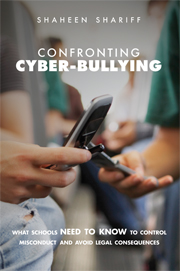 Confronting Cyber-Bullying
Confronting Cyber-Bullying Book contents
- Frontmatter
- Contents
- Figures
- Tables
- Preface
- Acknowledgments
- 1 Cyber Misconduct: Who Is Lord of the Bullies?
- 2 Profile of Traditional and Cyber-Bullying
- 3 Cyber Libel or Criminal Harassment: When Do Kids Cross the Line?
- 4 Student Free Expression: Do the Schoolhouse Gates Extend to Cyberspace?
- 5 Fostering Positive School Environments: Physical and Virtual
- 6 Censoring Cyberspace: Can Kids Be Controlled?
- 7 The Tragedy of the Commons: Lessons for Cyberspace?
- 8 Cyber Collaboration: Models for Critical Legal Pluralism in Teacher Education Programs
- Notes
- Cases
- Index
- References
7 - The Tragedy of the Commons: Lessons for Cyberspace?
Published online by Cambridge University Press: 02 July 2009
- Frontmatter
- Contents
- Figures
- Tables
- Preface
- Acknowledgments
- 1 Cyber Misconduct: Who Is Lord of the Bullies?
- 2 Profile of Traditional and Cyber-Bullying
- 3 Cyber Libel or Criminal Harassment: When Do Kids Cross the Line?
- 4 Student Free Expression: Do the Schoolhouse Gates Extend to Cyberspace?
- 5 Fostering Positive School Environments: Physical and Virtual
- 6 Censoring Cyberspace: Can Kids Be Controlled?
- 7 The Tragedy of the Commons: Lessons for Cyberspace?
- 8 Cyber Collaboration: Models for Critical Legal Pluralism in Teacher Education Programs
- Notes
- Cases
- Index
- References
Summary
Ruin is the destination toward which all men rush, each pursuing his own best interest in a society that believes in the freedom of the commons. Freedom in a commons brings ruin to all.
(Harden, 1968)INTRODUCTION
According to Thomas McMorrow (2007), cyberspace, in some ways, works much like a commons. Fulfillment of its potential presupposes maximum public access. In England, a commons is a place where cattle are herded to graze together. Like the commons, cyberspace remains empty and frustrated without collective human involvement. McMorrow explains that much in the same way that herdsman bring their cattle to graze together on the commons, “mouse-wielding drivers” (p. 2) of the Internet need to be brought together in an unconfined space. The unconfined aspect of that space is important. He observes that the tragedy, or irony, of the commons resides in the fact the very principle of freedom of access on which it is based also inevitably leads to its destruction:
[A] space that all can enter is a space that all can abuse. Each herdsman in seeking to maximize her gain adds one more head of cattle, since the benefit of having one more of her cows grazing in the commons accrues to her alone, whereas the negative consequences of overgrazing must be borne equally by everyone. In the end, though, with each person trapped in this logic, the number of cattle grazing goes beyond what the commons can sustain, and the land becomes worthless to everyone. The problem is that while the herdsman feels compelled to increase her herd without limit, she wishes to do it in a world that is limited. No technical solution serves as an exit from this trap. Bigger commons or more resilient strains of grass only forestall the problem. The answer is not to be found in technology alone.
The only way the tragedy can be avoided is for people to change their behavior. Destruction of the commons is inevitable only so long as people only prize their short-term self-interest. The key is temperance but self-restraint within this context is not only difficult but ultimately ineffectual when it consists in a solitary act alone. What is needed is collective recognition of the mutual benefit of the commons, a genuine willingness on behalf of everyone to make the necessary sacrifice to secure the common good, and a general programme of action for everyone to follow. In other words, there need to be guidelines; for the promise of the commons to be fulfilled, there have to be laws.
(McMorrow, 2007, emphasis added)- Type
- Chapter
- Information
- Confronting Cyber-BullyingWhat Schools Need to Know to Control Misconduct and Avoid Legal Consequences, pp. 190 - 211Publisher: Cambridge University PressPrint publication year: 2009
